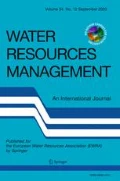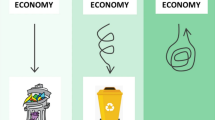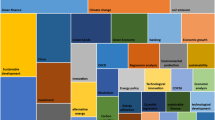Abstract
The nexus approach is a promising method used to address issues regarding environmental dilemmas. However, effective consumption-based and production-based nexus governance strategies are not well understood. Using data envelopment analysis and China’s provincial data for 2017, this study analysed the input–output efficiency of the water-energy-food nexus by considering production-based intensity, consumption-based intensity, and the quantity index system. The results show that policies involving consumption-based intensity metrics can be more efficient, and the efficiency of both production-based intensity (0.482) and consumption-based intensity (0.682) are much higher than the efficiency of the quantity (0.378) index system. The results also indicate that province-specific consumption-based governance strategies are crucial for 30 provinces in China. Finally, three policy directions for nexus governance in China are proposed, namely, shifting policy attention from production-based governance to consumption-based governance, focusing intensity metrics on scale efficiency and aiming quantity metrics on pure technical efficiency, and localizing province-specific management strategies. This paper compares consumption-based and production-based nexus approaches, and the results indicate that a call for consumption-based approaches in future nexus modelling and governance is appropriate. This paper also has implications for China’s nexus governance.




Similar content being viewed by others
Data Availability
The data used in this study are statistical data. The China Statistical Yearbook (2018), the China Energy Statistical Yearbook (2018), the China Rural Statistical Yearbook (2018), and the Ministry of Water Resources (2017) are publicly published.
Code availability
Win4deap 2.1 software, which is free software, was employed to conduct the DEA efficiency calculation. All figures in this paper were mapped with Microsoft office software.
References
Albrecht TR, Crootof A, Scott CA (2018) The water-energy-food nexus: a systematic review of methods for nexus assessment. Environ Res Lett 13:043002
Arthur M, Liu G, Hao Y, Zhang L et al (2019) Urban food-energy-water nexus indicators: a review. Resour Conserv Recycl 151:104481
Artioli F, Acuto M, McArthur J (2017) The water-energy-food nexus: an integration agenda and implications for urban governance. Polit Geogr 61:215–223
Benson D, Gain A, Rouillard J (2015) Water governance in a comparative perspective: from IWRM to a ‘Nexus’ approach. Water Altern 8(1):756–773
Chen I-C, Wang Y-H, Lin W, Ma H (2020) Assessing the risk of the food-energy-water nexus of urban metabolism: A case study of Kinmen Island, Taiwan. Ecol Indic 110:105861
Conway D, van Garderen EA, Deryng D, Dorling S et al (2015) Climate and southern Africa’s water-energy-food nexus. Nat Clim Chang 5(9):837–846
Covarrubias M, Spaargaren G, Boas I (2019) Network governance and the Urban Nexus of water, energy, and food: lessons from Amsterdam. Energy Sustain Soc 9:14
Dai J, Wu S, Han G, Weinberg J et al (2018) Water-energy nexus: a review of methods and tools for macro-assessment. Appl Energy 210:393–408
Dalla Fontana M, Moreira FdA, Di Giulio GM, Malheiros TF (2020) The water-energy-food nexus research in the Brazilian context: what are we missing? Environ Sci Pol 112:172–180
EL-Gafy I, Grigg N, Waskom R (2017) Water-food-energy: nexus and non-nexus approaches for optimal cropping pattern. Water Resour Manag 31:4971–4980
Endo A, Burnett K, Orencio PM, Kumazawa T et al (2015) Methods of the water-energy-food nexus. Water 7:5806–5830
Garcia DJ, You F (2016) The water-energy-food nexus and process systems engineering: a new focus. Comput Chem Eng 91:49–67
Geng Z, Hu X, Han Y, Zhong Y (2019) A novel leakage-detection method based on sensitivity matrix of pipe flow: case study of water distribution systems. J Water Resour Plan Manag 145(2):04018094
Han Y, Wu H, Geng Z, Zhu Q, Gu X, Yu B (2020) Review: energy efficiency evaluation of complex petrochemical industries. Energy 203:117893
Hoff H (2011) Understanding the nexus. Background paper for the Bonn 2011 conference: the water, energy and food security nexus. Stockholm Environment Institute, Stockholm
Hu X, Han Y, Yu B, Geng Z, Fan J (2021) Novel leakage detection and water loss management of urban water supply network using multiscale neural networks. J Clean Prod 278:123611
Huang D, Li G, Sun C, Liu Q (2020) Exploring interactions in the local water-energy-food nexus (WEF-Nexus) using a simultaneous equations model. Sci Total Environ 703:135034
Huckleberry JK, Potts MD (2019) Constraints to implementing the food-energy-water nexus concept: governance in the Lower Colorado River Basin. Environ Sci Pol 92:289–298
Hussien WA, Memon FA, Savic DA (2017) An integrated model to evaluate water-energy-food nexus at a household scale. Environ Model Softw 93:366–380
Karnib A (2018) Bridging science and policy in water-energy-food nexus: using the Q-Nexus model for informing policy making. Water Resour Manag 32:4895–4909
Lam H-M, Remais J, Fung M-C, Xu L, Sun SS-M (2013) Food supply and food safety issues in China. Lancet 381(9882):2044–2053
Leung Pah Hang MY, Martinez-Hernandez E, Leach M, Yang A (2016) Designing integrated local production systems: a study on the food energy-water nexus. J Clean Prod 135:1065–1084
Li G, Huang D, Li Y (2016) China’s input-output efficiency of water-energy-food nexus based on data envelopment analysis (DEA) model. Sustainability 8:927
Liu J, Li X, Yang H et al (2019) The water-energy nexus of megacities extends beyond geographic boundaries: a case of Beijing. Environ Eng Sci 36(7):778–788
Mardani A, Streimikiene D, Balezentis T et al (2018) Data envelopment analysis in energy and environmental economics: an overview of the State-of-the-Art and recent development trends. Energies 11(8):1–21
Märker C, Venghaus S, Hake J-F (2018) Integrated governance for the food-energy-water nexus-the scope of action for institutional change. Renew Sust Energ Rev 97:290–300
Martin R (2003) Is it time to resurrect the Harvard Water Program. J Water Resour Plan Manag 129(5):357–361
Ministry of Water Resources, National Development and Reform Commission (2016) Action plan on quantity and intensity control of water consumption. Beijing
Ministry of Water Resources (2017) China water resources bulletin. Beijing. http://www.mwr.gov.cn/sj/tjgb/szygb/201811/t20181116_1055003.html
Mohtar RH, Daher B (2016) Water-energy-food nexus framework for facilitating multi-stakeholder dialogue. Water Int 41(5):655–661
Müller A, Janetschek H, Weigelt J (2015) Towards a governance heuristic for sustainable development. Curr Opin Environ Sustain 15:49–56
Namany S, Al-Ansari T, Govindan R (2019) Sustainable energy, water and food nexus systems: a focused review of decision-making tools for efficient resource management and governance. J Clean Prod 225:610–626
Nie Y, Avraamidou S, Xiao X, Pistikopoulos EN et al (2019) A food-energy-water nexus approach for land use optimization. Sci Total Environ 659:7–19
Pahl-Wostl C (2019) Governance of the water-energy-food security nexus a multi-level coordination challenge. Environ Sci Pol 92:356–367
Pullinger M, Browne A, Anderson B et al (2013) Patterns of water: the water related practices of households in southern England, and their influence on water consumption and demand management. Lancaster University, Lancaster
Scanlon BR, Ruddell BL, Reed PM, Hook RI, Zheng C et al (2017) The food-energy-water nexus: transforming science for society. Water Resour Res 53:3550–3556
Shen T, Chen Y, Yang Q (2015) Energy consumption in urban household water use and influencing factors. Resour Sci 37(4):744–753
Su Y, Gao W, Guan D, Zuo T (2020) Achieving Urban Water security: a review of water management approach from technology perspective. Water Resour Manag 34:4163–4179
Visseren-Hamakers IJ (2015) Integrative environmental governance: enhancing governance in the era of synergies. Curr Opin Environ Sustain 14:136–143
Voelker T, Blackstock K, Kovacic Z, Sindt J et al (2019) The role of metrics in the governance of the water-energy-food nexus within the European Commission. J Rural Stud. https://doi.org/10.1016/j.jrurstud.2019.08.001
Wang H, Tao R, Wang L, Su F (2010) Farmland preservation and land development rights trading in Zhejiang. China Habitat Int 34(4):454–463
Wang F, Yu C, Xiong L, Chang Y (2019) How can agricultural water use efficiency be promoted in China? A spatial-temporal analysis. Resour Conserv Recycl 145:411–418
Wei Q (2004) Data envelopment analysis. Science Press, Beijing, pp 2–20
Weitz N, Strambo C, Kemp-Benedict E, Nilsson M (2017) Closing the governance gaps in the water-energy-food nexus: Insights from integrative governance. Glob Environ Chang 45:165–173
Wichelns D (2017) The water-energy-food nexus: Is the increasing attention warranted, from either a research or policy perspective? Environ Sci Pol 69:113–123
Wolman A (1965) The metabolism of cities. Sci Am 213:179–190
Wu L, Elshorbagy A, Pande S, Zhuo L (2021) Trade-offs and synergies in the water-energy-food nexus: the case of Saskatchewan, Canada. Resour Conserv Recycl 164:105192
Yan X, Fang L, Mu L (2020) How does the water-energy-food nexus work in developing countries? An empirical study of China. Sci Total Environ 716:134791
Zhang X, Vesselinov VV (2017) Integrated modeling approach for optimal management of water, energy and food security nexus. Adv Water Resour 101:1–10
Zhang J, Liu Y, Chang Y, Zhang L (2017) Industrial eco-efficiency in China: a provincial quantification using three-stage data envelopment analysis. J Clean Prod 143:238–249
Zhang C, Chen X, Li Y, Ding W, Fu G (2018) Water-energy-food nexus: concepts, questions and methodologies. J Clean Prod 195:625–639
Zhang T, Tan Q, Zhang S, Zhang T, Zhang W (2021) A participatory methodology for characterizing and prescribing water-energy-food nexus based on improved casual loop diagrams. Resour Conserv Recycl 164:105124
Zou C, Gao X, Shi R, Fan X, Zhang F (2008) Micronutrient deficiencies in crop production in China. In: Alloway BJ (ed) Micronutrient deficiencies in global crop production. Springer, New York, pp 127–48
Funding
This work was supported by the National Natural Science Foundation of China (Grant Nos. 51878026), the Key Scientific Research Projects of the Social Science Program of the Beijing Municipal Commission of Education (Grant Nos. SZ202010016008), the Beijing Social Science Foundation Project (Grant Nos. 19GLB080), and the Fundamental Research Funds for the Beijing University of Civil Engineering and Architecture (Grant Nos. X20041).
Author information
Authors and Affiliations
Contributions
D.H. designed and wrote the manuscript, Z.S. collected the data and conducted the calculation, C.S. drafted the methodology section, and G.L. participated in the manuscript design and drafted the discussion section. C.S. and G.L. participated in the revision, D.H. wrote the responses to editor and reviewers.
Corresponding authors
Ethics declarations
Ethical Approval
Not applicable.
Consent to participate
Not applicable.
Consent to publish
Not applicable.
Conflict of interest
The authors declare no conflict of interest.
Additional information
Publisher’s Note
Springer Nature remains neutral with regard to jurisdictional claims in published maps and institutional affiliations.
Rights and permissions
About this article
Cite this article
Huang, D., Shen, Z., Sun, C. et al. Shifting from Production-Based to Consumption-Based Nexus Governance: Evidence from an Input–Output Analysis of the Local Water-Energy-Food Nexus. Water Resour Manage 35, 1673–1688 (2021). https://doi.org/10.1007/s11269-021-02797-4
Received:
Accepted:
Published:
Issue Date:
DOI: https://doi.org/10.1007/s11269-021-02797-4




